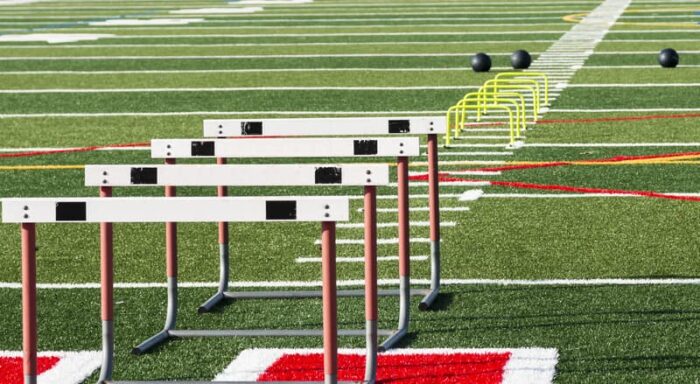- Calls to this hotline are currently being directed to Within Health, Fay or Eating Disorder Solutions
- Representatives are standing by 24/7 to help answer your questions
- All calls are confidential and HIPAA compliant
- There is no obligation or cost to call
- Eating Disorder Hope does not receive any commissions or fees dependent upon which provider you select
- Additional treatment providers are located on our directory or samhsa.gov
Screening for Eating Disorders Among High School Athletes

Screening can help figure out who needs treatment for disordered eating. This is important since the number of adolescent athletes who are struggling with eating disorders is continuing to increase [1]. Researchers have been looking into what screening tools are effective for this population.
High School Athletes & Eating Disorders
Athletes are one group of people that are at an increased risk for developing eating disorders. Both male and female athletes are impacted. In fact, 33% of boys and about 62% of female athletes struggle with disordered eating [2].
Even though these statistics are alarming, only 27% of coaches felt comfortable working with someone with an eating disorder. Having prevention methods, such as screening, can help bridge the gap between struggling athletes and treatment.
You might be wondering why athletes are at an increased risk for eating disorders. Here are some theories as to why this might be.
Why Are Athletes More at Risk for Eating Disorders?
There are a lot of factors that can contribute to someone developing an eating disorder. For example, research shows that societal factors like weight stigma can contribute to disordered eating [2]. Similarly, genetics and other environmental factors can also play a role.
Setting aside unique factors like home environment, there are a few reasons why athletes are at an increased risk. These risks include:
- Risk of not being able to participate in sporting events if they’re above the weight limit for a weight-class sport like wrestling or rowing
- Increased focus on an appearance on body shape or size in aesthetically judged sports like ballet, figure skating, or diving
- Increased risk of lowered performance if at a higher weight than what is believed to be ideal [3]
Other factors that may increase the odds of struggling with disordered eating are:
- Pressure from family, friends, or peers to excel athletically
- Low self-esteem
- Family history of eating disorders
- Coaches who focus only on achievements rather than treating the athlete as a whole person
- Belief that being at a lower weight will increase their performance
- Not eating enough to make up for the amount of physical activity they’re doing
- History of trauma
- Relationship stressors
- Mental health issues like anxiety or depression [3]
Thankfully, researchers are looking into the best way to identify individuals who are showing signs or symptoms of an eating disorder. This can help teachers, coaches, parents, and healthcare professionals refer high school athletes for help.

Screening Methods for Eating Disorders in High School Athletes
A recent study looked into which screening tools would be the easiest and most reliable for a variety of professionals to use to figure out who is at a risk for eating disorders or who is already struggling [1]. Researchers found that there is a six-item questionnaire, The Disordered Eating Screen for Athletes (DESA-6), that can be used for boy and girl athletes.
The DESA-6 is promising because it doesn’t take long to complete and is about 92% accurate. This can help people who don’t have a background in mental health to feel comfortable using screening measures [1]. However, while the DESA-6 is helpful for adolescent athletes, it doesn’t work for adult athletes or athletes from a wide variety of sports. Future research is needed to create screening measures for these populations.
Is Screening Enough?
No! Even though screening helps, it’s not the only thing that is needed to help support adolescent athletes. Ideally, there would be a shift in the way our society approaches food, body image, and exercise.
Increasing access to mental health resources could also be beneficial. Considering that unresolved mental health issues, such as anxiety, depression, or trauma, can feed into someone’s eating disorder then increased access to mental health care could be helpful.
There’s a lot of work to do, but screening can help adolescent athletes get help before their eating disorder manifests into something more severe.
Resources:
[1] Kennedy, S., Kovan, J., Werner, E., Mancine, R., Gusfa, D., & Kleiman, H. (2021). Initial validation of a screening tool for eating disorders in adolescent athletes. Journal of Eating Disorders, 9(21), 1-11. [2] National Eating Disorders Association. (2021). Statistics and Research on Eating Disorders. https://www.nationaleatingdisorders.org/statistics-research-eating-disorders [3] Magnolia Creek Treatment Center for Eating Disorders. (2018, November 13). Why do athletes struggle with eating disorders? https://www.magnolia-creek.com/eating-disorder-recovery-blog/why-do-athletes-struggle-with-eating-disorders/About the Author:
 Samantha Bothwell, LMFT, is a licensed Marriage and Family Therapist, writer, explorer, and lipstick aficionado. She became a therapist after doing her own healing work so she could become whole after spending many years living with her mind and body disconnected. She has focused her clinical work to support the healing process of survivors of sexual violence and eating disorders. She is passionate about guiding people in their return to their truest Self so they can live their most authentic, peaceful life.
Samantha Bothwell, LMFT, is a licensed Marriage and Family Therapist, writer, explorer, and lipstick aficionado. She became a therapist after doing her own healing work so she could become whole after spending many years living with her mind and body disconnected. She has focused her clinical work to support the healing process of survivors of sexual violence and eating disorders. She is passionate about guiding people in their return to their truest Self so they can live their most authentic, peaceful life.
The opinions and views of our guest contributors are shared to provide a broad perspective on eating disorders. These are not necessarily the views of Eating Disorder Hope, but an effort to offer a discussion of various issues by different concerned individuals.
We at Eating Disorder Hope understand that eating disorders result from a combination of environmental and genetic factors. If you or a loved one are suffering from an eating disorder, please know that there is hope for you, and seek immediate professional help.
Published June 28, 2021, on EatingDisorderHope.com
Reviewed & Approved on June 28, 2021, by Jacquelyn Ekern MS, LPC

The EatingDisorderHope.com editorial team comprises experienced writers, editors, and medical reviewers specializing in eating disorders, treatment, and mental and behavioral health.

